This guy is shaping the world, and if he's learned anything, we should take note.
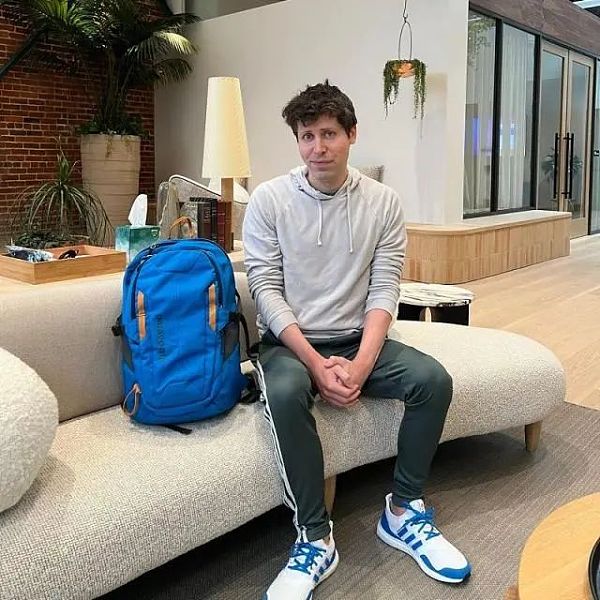
"Days are long, but decades are short."
Sam Altman wrote this proverbial blog nine years ago , I wonder if I had any premonition that I would be the one to lead the AI revolution.
At the end of 2023, he returned to the proverbs after many years and published a blog titled "Things I Wish Someone Told Me", condensing what he had learned in the past year into ten In seven short sentences. (The boldfaced part below, the interpretation of the boldfaced part comes from the editor.)
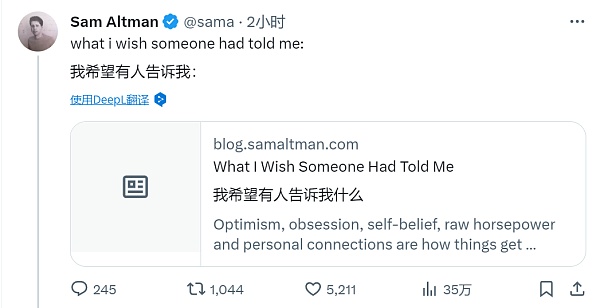
The past year has been exciting and crazy.
OpenAI led by Altman launched an AI tool that the world really liked and benefited from, and the world began to take AI seriously.
On the positive side, I learned a lot this year, he wrote.
If you are seriously thinking about what to do in 2024, I hope this blog will be helpful to you.
1. Optimism, addiction, self-confidence, raw horsepower and establishing connections with people are how things open up.
OpenAI’s first few years were difficult, in part because even they didn’t know if they were pursuing an extremely expensive dead end.
It is easy to copy something, but it is really difficult to make real innovation.
What is the right feeling? Is it the correct way to open it? Altman summarized the above keywords.
This is also very similar to how he is described by publications such as The New Yorker and The Atlantic Monthly - he is an optimist and extremely confident, even by Silicon Valley standards.
Like Musk, he has firm belief in his future vision. Like Steve Jobs, he has a messianic ability to inspire others.

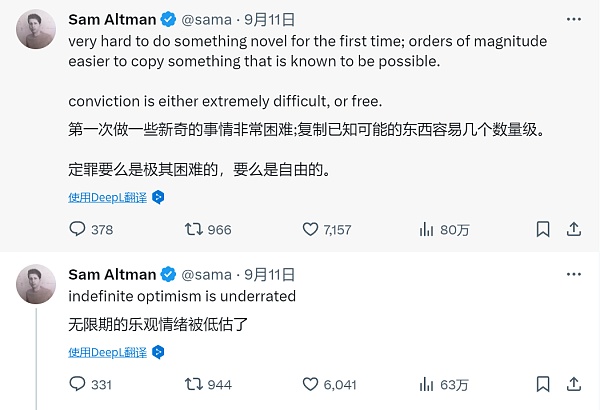
YC co-founder once commented that he was only in his early 20s at the time Altman, "You can parachute him to an island full of cannibals and see him again five years later. He is the king there."
He once said in an interview that the difference between me and most AI companies is that I think AI is good.
Don't secretly resent your career, I think it's great.
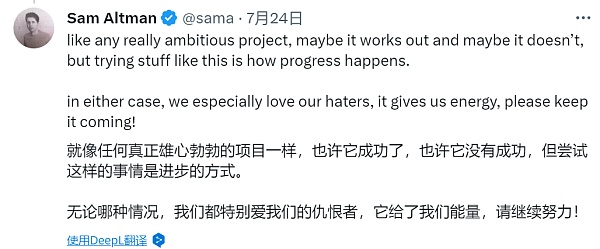
By the way, on "Building Connections with People", he wrote as early as nine years ago, "Talk more to people. Read more long content, less tweets. Watch less TV. Spend more time. Less time online."
2. A cohesive team, a balance of calmness and urgency, and unreasonable commitment - this is how things get done. It's not common to think long term (long-term orientation); try not to worry about what people think in the short term, it will become easier for you to do this over time.
What does it look like to get things done? Here's Altman's answer.
He once said that a stronger, more united, more focused, and more loyal team helped OpenAI tide over the difficulties.
The fury of the hurricane is only on the outside. After passing through the hurricane wall and reaching the eye of the hurricane, you will find that it is very peaceful here. "I think we had a lot of faith and focus before, and now we have more," he said.
Talking about my dedication to OpenAI - I have devoted myself to this company for the past four and a half years, but in fact it has been longer than that, and most of my time has been devoted to it. Companies are also making huge strides toward safe and beneficial AGI.
When he received the invitation from the board to return to the company, it took him a few minutes to gather himself, get over his ego and emotions, and say, "Yes, of course I want to do that."
3 , It is much easier for a team to do a really important and difficult thing than to do an inconsequential and simple thing. Bold ideas can inspire people.
Indeed. In 2021, he wrote "Moore's Law of Everything," a utopian manifesto predicting that the AI revolution (which he is leading) would saturate the earth. In that declaration, AI will create astonishing wealth, change the nature of work, and reduce poverty.


As an enthusiastic fan of nuclear fusion, he believes that this This technology, together with generative AI, will allow the cost of knowledge and energy to decline in a "beautiful exponential curve." As we've seen, he's driven OpenAI forward with missionary zeal over the past year.
4. Incentives have superpowers, so set them carefully.
5. Focusing resources on a small number of high-conviction bets is easier said than done. There are more options that can be removed than you think.
The stakes here should undoubtedly be the huge progress OpenAI has made in the past year on safe and beneficial AGI. OpenAI had a tough first few years, partly because they didn't know if they were pursuing an extremely expensive dead end.
6. Communicate as clearly and concisely as possible.
7. When you encounter bureaucracy and nonsense, fight it, and let others fight it. Don’t let organizational structure prevent everyone from working together effectively.
Together with No. 6 above, he once again reiterated the experience he learned many years ago - be a doer, not a talker.
8. The result is the most important. A good process cannot be an excuse for bad results.
9. Spend more time recruiting. Dare to invest in people with great potential and rapid progress. In addition to intelligence, you should also look for evidence of the other person's ability to do the job.
Altman once said publicly that to recognize people with a keen eye, you should not be limited to others' past work experience and current achievements. You need to discover those who have potential and can stimulate their potential in a short period of time.
Whenever he meets a new person, Altman will ask himself, "Does this person have abilities that are different from ordinary people?" For those who are hungry for talents, this question is worth thinking about.
Driving force is also the first thing he examines when understanding others.
10. Superstars are more valuable than they appear, but evaluating them depends on their net impact on organizational performance.
11. Rapid iteration can make up for many shortcomings; if iteration is rapid, mistakes are usually acceptable. Planning should be in terms of ten years and execution in terms of weeks.
Altman believed that empiricism was the key to progress.
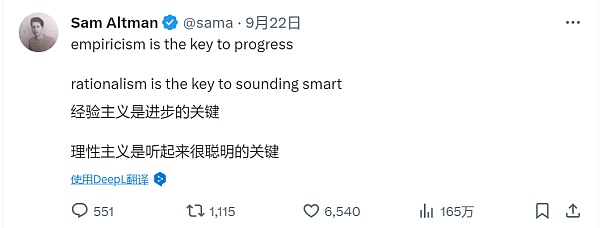
When great innovation occurs, it almost certainly appears in a messy, incomplete, and confusing form.
To the discoverer himself it would be only half understood; to others it would be a mystery.
When dealing with high uncertainty, choosing what not to do can be difficult and decision-making becomes tricky. At this point, don’t underestimate the value of “done is better than perfect” advice.
Musk SpaceX is a model.
In order to quickly build large spacecraft, each new iteration builds on the improvements of the previous iteration - whether it is a smoother manufacturing process, reducing unnecessary weight, improving performance, etc.
Building many rockets can achieve a gradual approach to the target. Musk once compared this process to a simple equation: The progress of any given technology is the number of iterations multiplied by the progress between iterations.
This is different from the approach of traditional aerospace agencies, which usually take years to perfect the design. Although this will reduce the chance of explosion, it also requires more time and money.
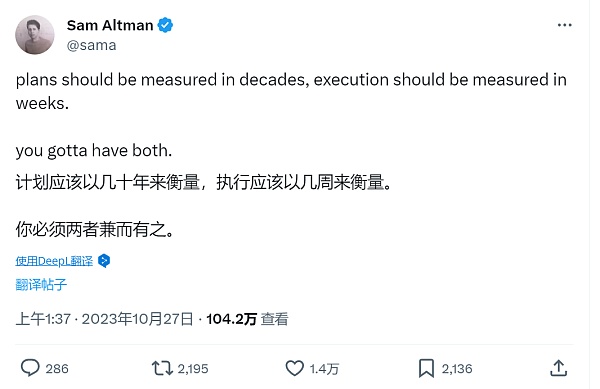
This one is also a reappearance of a previous tweet by Altman.
As for whether the plan should be based on ten years, you might as well look at his predictions in 2019, especially the second one.
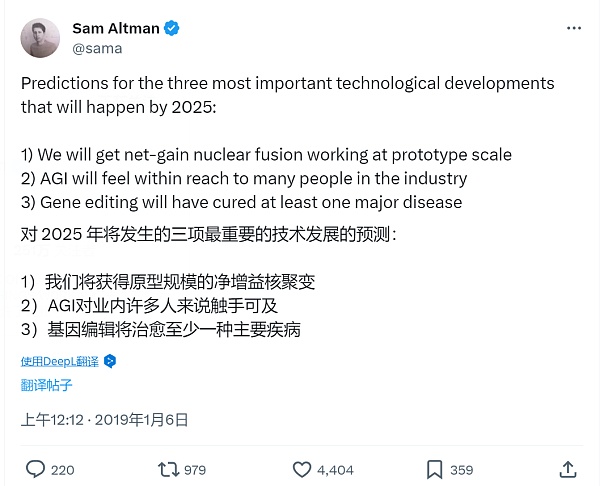
12. Don’t go against the business equivalent of the laws of physics.
We speculate that this sentence refers to some basic assumptions that affect business operations, such as human nature's short-sightedness and aversion to change.
Give me an example. Newton's first law states that an object in motion has a tendency to remain in motion, and an object at rest has a tendency to remain at rest unless it is forced to change by the force of another object.
The same is true for human nature. Altman once talked about the problems that some founders who have worked for a long time at Google and Meta have:
A comfortable life, a stable job, and a reputation for success in whatever they do will make it difficult for them to abandon these, even if they really do If you leave the company, you are very likely to come back. Compared with long-term interests, short-term temptations and conveniences are often more attractive and more in line with human nature.
Another example is the principle of entropy increase. In nature, entropy increase is a spontaneous process that develops from order to disorder. From this perspective, the disorder currently brought about by ChatGPT makes information control very difficult, and it is also a phenomenon that we must face.
13. Inspiration is fleeting and life is fleeting. Inaction is a particularly insidious risk.
Enterprises and markets can create miracles of growth, but time cannot. It is fair to everyone.
Altman takes time very seriously. This time I also resonated again with some of the ideas I shared in that blog post nine years ago.
For example, "Time is extremely limited and passes quickly." ."
"Don't waste time. Most people waste most of their time, especially in business."
So, "Do what makes you happy" Things that make you happy and satisfying - few people are remembered hundreds of years after their death anyway.
Don't do things that don't make you happy (this happens most often when someone else wants you to do when something).
Don’t spend your time trying to maintain relationships with people you don’t like, cut negative people out of your life.
Negativity really sucks. Don’t let yourself feel guilty for not being yourself Make excuses for things you want to do.”
14. Scale often has surprising emergent properties. (Scale often has surprising emergent properties.)
For this point, Jason Wei, an OpenAI researcher and the proposer of the thinking chain, should be one of the most enlightened people.
Jason Wei et al.'s paper is the first to find that there is a phase transition when prompting using chain thinking, showing that large models outperform smaller models by a large margin, which further leads to emergent capabilities discovery.
Interestingly, he also responded specifically to this point. The relationship between scale and emergent characteristics exists not only in language models, but also in "human beings."
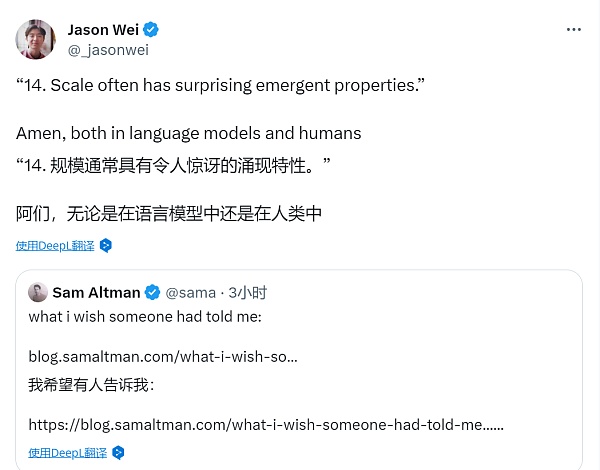
15. Compounding exponentials are amazing. In particular, you really want to build a business that has a compounding advantage with scale.
In that widely circulated article how to be successful , Altman talked about the magical power of compound interest and the exponential curve is the key to creating wealth. Few companies in the world have true network effects and a high degree of scalability, but as technology advances, this situation will gradually change, which is worth our continuous efforts.
16. Stand up again and keep moving forward.
In his 38 years of life, OpenAI’s personnel turmoil was not the first time he had been at the center of a whirlpool. He would also say on social media, "I dream about failure all night long."
He also said, "Given enough time, you can adapt to almost anything, good or bad. Human beings are amazing at this. .》
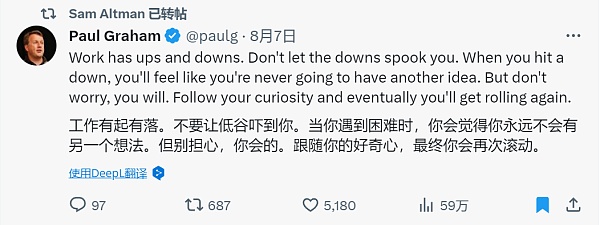
17. Working with great people is one of the best parts of life.
After experiencing the shock of OpenAI, this is also one of Altman’s biggest feelings.
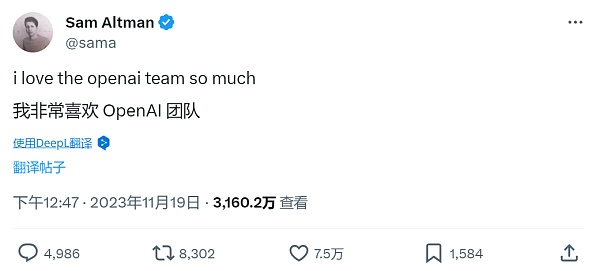
He said, how to work hard without overdrafting your body? There’s a golden rule that’s almost never wrong – work with people you enjoy doing work you enjoy.
As I wrote nine years ago, "Do your best to surround yourself with smart, interesting, ambitious people. Work for them and hire them (in fact, one of the most satisfying parts of the job is working with real people Excellent people build deep relationships).
Try spending time with people who are either the best in the world in their field or very promising but completely unknown. Indeed, you will reach the point where you spend the most time with the people you spend the most time with The average level."
Reference link
https://blog.samaltman.com/what-i-wish-someone-had-told-me
 JinseFinance
JinseFinance
 JinseFinance
JinseFinance Hui Xin
Hui Xin Olive
Olive JinseFinance
JinseFinance JinseFinance
JinseFinance Bernice
Bernice Hui Xin
Hui Xin Kikyo
Kikyo Ledgerinsights
Ledgerinsights Bitcoinist
Bitcoinist